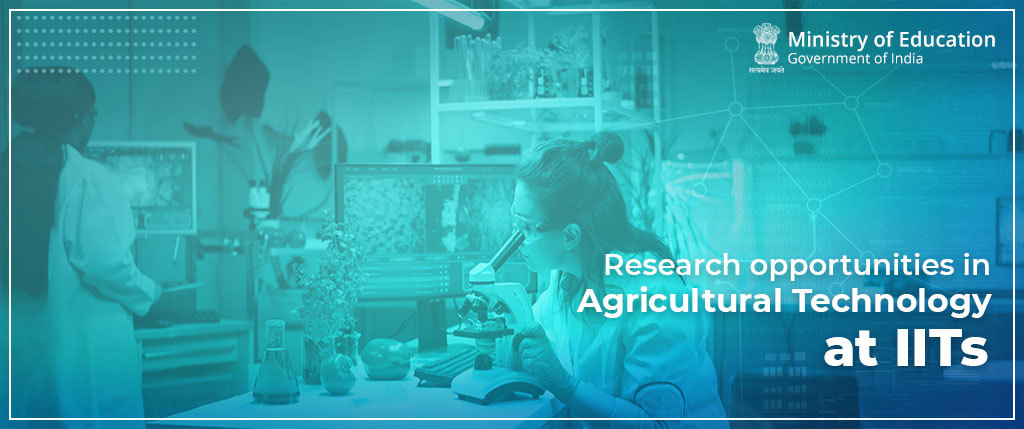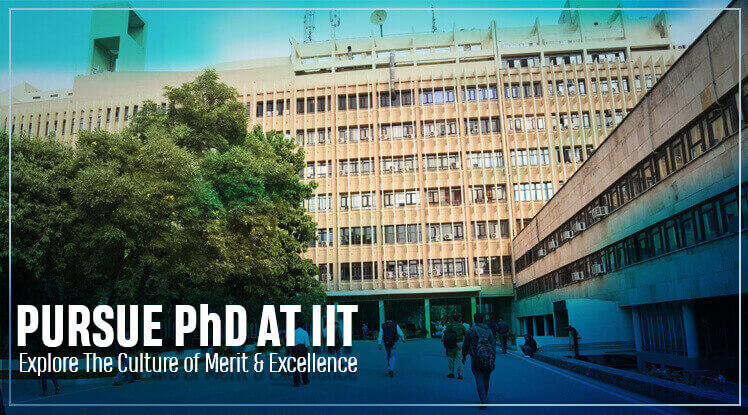Research opportunities in Agricultural Technology at IITs

Agriculture is the primary source of livelihood for a majority of the population in India, more so in the vast rural areas. It also contributes a significant share to the Gross Domestic Product (GDP) of the country. The share of agriculture in GDP increased to 19.9 percent in 2020-21 from 17.8 percent in 2019-20. In terms of food security, rural employment, technology in agriculture, and environmentally sustainable technologies such as soil conservation, sustainable natural resource management, and biodiversity conservation, sustainable agriculture is essential for holistic rural development. Agricultural research and development (R&D) are fundamental for the planned growth and sustainable development of agriculture in the country. India has one of the largest and well-coordinated agricultural R&D systems in the world. It has been operational for more than a century, though its main expansion took place after independence in 1947. The Indian Council of Agricultural Research (ICAR) is the nodal agency at the national level for the promotion of science and technology in the areas of agricultural research and education and the demonstration of new technologies as frontline extension activities. ICAR has been credited with ushering in the Green Revolution in India. The institute has also played a major role in promoting excellence in higher agricultural education.
The tradition of strong government support for science and technology (S&T) has produced an excellent S&T infrastructure in India. It includes research laboratories, a vast network of institutions of higher learning, and a cadre of highly skilled human resources. India is the third-largest scientific and technical manpower pool in the world with many world-class, internationally ranked universities awarding more than 40000 doctorates annually. India has emerged as the world’s third-largest publisher of science and engineering articles. Indian Institutes of Technology (IITs) are known nationally and internationally for excellence in technical education, innovation, entrepreneurship, and research. IITs, with their rich legacy and global branding, are the best place to pursue research in agricultural technology.
Considering the importance of agriculture in ensuring food and nutritional security, the Agricultural and Food Engineering Department had been incepted at the Indian Institute of Technology, Kharagpur, in 1952. In terms of agricultural engineering in IIT and Ph.D. in agricultural engineering, among 23 IITs, IIT Kharagpur has the sole distinction of having an Agricultural & Food Engineering Department. The department encourages multi-disciplinary research and facilitates financial support for the presentation of research outcomes in international fora that ultimately helps inter-disciplinary and international collaborations. The major domain of research and development includes Precision agriculture, biofuel and bioenergy, modern food processing, plasticulture and micro-irrigation, Climate Change, hydrological modeling, groundwater management, water management, agricultural biotechnology, pollution abatement, extrusion technology, intelligent and high-pressure packaging, soil mapping and image analysis for plant phenotyping.
Apply for a PhD at IITs
Apply for a PhD at IITs — the best technology institutions of India
Centre for Rural Development and Technology is one of the renowned academic units of IIT Delhi for agriculture research & technology. It came into existence in 1979 with the aim of becoming an outreach center of IIT Delhi to address challenges faced by rural communities and to improve their quality of life. It has made significant contributions by developing and transferring technologies in areas including algal bioenergy, biomass technologies, biogas technologies, ecological sanitation, food quality, and safety, sustainable agriculture, sustainable housing, value-added food products, water, and waste management, sustainable agriculture research, and education, etc.
School of Agro and Rural Technology (SART), renamed from Centre for Rural Technology in the year 2021, at IIT Guwahati promotes multidisciplinary activities such as teaching, research and provides consultancy in various facets of rural sectors with special emphasis on training and research needs of the Indian rural sector and contributing to International research in Appropriate Technology for the rural community. The Centre for Technology Alternatives for Rural Areas (CTARA) of IIT Bombay now has an MTech Program in Technology and Development and a Ph.D. Program. Agriculture and Water Technology Development Hub (AWaDH) is a research center at IIT Ropar established with support from the Department of Science and Technology (DST) to carry out cutting-edge interdisciplinary research in the field of agriculture and water.
The BioXcentre at IIT Mandi serves as an ecosystem to facilitate collaborative research in various areas of agriculture, environment, and human health. The Centre’s mission is to pursue excellence in research, innovation, and discovery with a focus on life sciences and technology development by promoting multi-institutional and interdisciplinary research activities in health-related and Agri-based challenges. The department of Water Resource Development & Management of IIT Roorkee is actively involved in research, development, and extension activities in the areas of water resources, hydropower, and irrigation management.
Additionally, most of the IITs offer Ph.D. programs in agricultural engineering and multiple agriculture research topics under the specialization of Water Resources Engineering in Civil and Environmental Engineering Departments.
Apply for a PhD at IITs
Apply for a PhD at IITs — the best technology institutions of India







